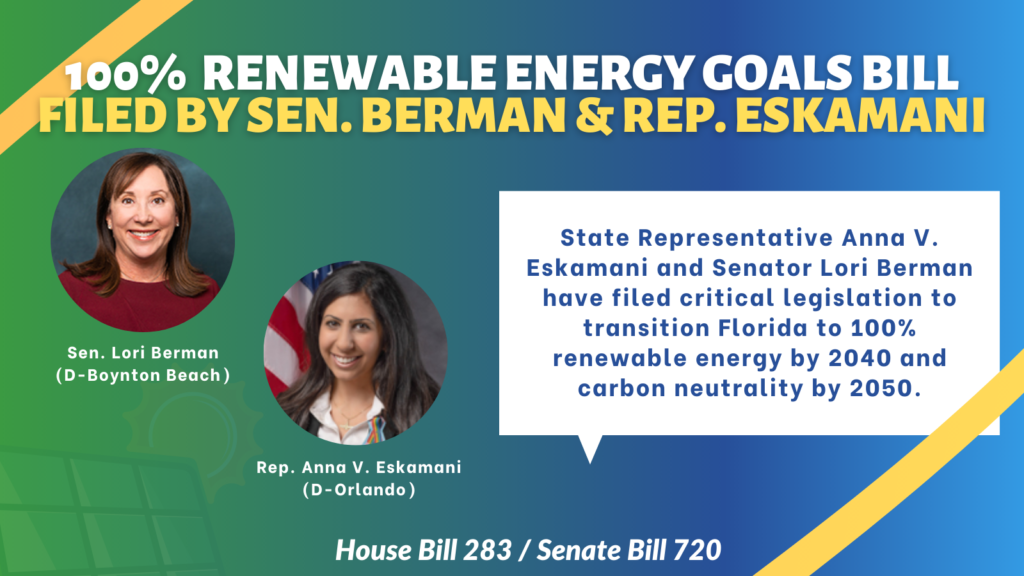The Bill to Transition Florida to 100% Renewable Energy Is Critical to Florida’s Environmental Health and Economic Success
Orlando, FL – State Representative Anna V. Eskamani (D-Orlando) and Senator Lori Berman (D-Boynton Beach) have filed critical legislation to transition Florida to 100 percent renewable energy by 2040 and carbon neutrality by 2050. House Bill 283 / Senate Bill 720 also ban fracking in Florida and establish a workforce board to ensure that Florida’s drive towards a clean energy economy produces new high paying jobs; a much needed initiative following the damaging impact of COVID19 on the state’s unemployment rate.
“Floridians are already feeling the effects of a warmer world and are in desperate need of new high paying jobs,” said Representative Eskamani. “Our state has a lot to lose if climate change goes unchecked and a lot to gain in championing renewable energy and energy efficiency. Clean air, clean water, and new high-paying jobs are in Florida’s future if we pass this bill.”
Growing awareness of the environmental impacts of our energy use, coupled with rapid advances in technology and declining costs, have made renewable energy the “go-to” option for many communities and businesses. Last year Tallahassee became the seventh city in Florida to commit to 100 percent clean, renewable energy, joining Orlando, St. Petersburg, Sarasota, Dunedin, Largo and Gainesville, to be joined later by South Miami, Satellite Beach, and Safety Harbor, bringing the total number of municipalities to 10.
“As the Sunshine State, Florida should be a nationwide leader in the push for 100 percent clean, renewable energy,” added Senator Lori Berman, the bill’s Senate Sponsor. “Inaction by the legislature fails Floridians, hurts our health, our economy and our precious ecosystems. As ground zero when it comes to sea level rise we also need to take responsibility for tackling not just the effects but our contribution to the causes of climate change.”
As emphasized in the bill, this is not just an environmental issue– it’s an economic one too.
During the Great Recession, Congress made investments in clean energy that helped to create hundreds of new American businesses and nearly one million jobs. Before the coronavirus took down the economy, clean energy was one of the nation’s strongest sectors, growing 70 percent faster than the economy as a whole. House Bill 283 / Senate Bill 720 would create a partnership between the Department of Energy and Department of Economic Opportunity to build a workforce board centered on championing clean energy jobs and employment trainings.
“Lifting up resilient job-creating industries that show the most potential for positive impact and rapid growth should be one of our biggest priorities,” said Senator Berman. “And that is exactly why we should be leading with investments in clean energy and working across government agencies to bolster clean energy jobs.”
An environmental justice organization must be included on the workforce board too. As Representative Eskamani stressed, “In the United States and around the world, vulnerable and marginalized populations like people of color, indigenous people, the elderly, children, and those with lower incomes are hit first and hardest by the climate crisis. We must make sure all communities are a part of a clean energy economy and benefit from it too.”
House Bill 283 and its Senate companion are both part of a much larger movement. In fact, over one hundred U.S. cities, led by a mix of Republican and Democratic mayors, have pledged to transition their power sources to 100 percent renewable energy. In addition, 191 major companies, including Johnson & Johnson, Walmart and General Motors, have pledged to power their entire operations with renewable energy.
###

